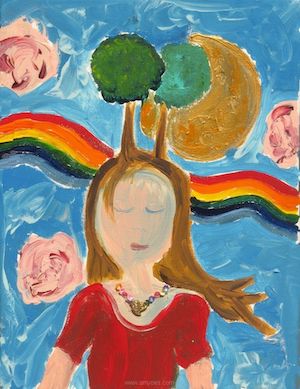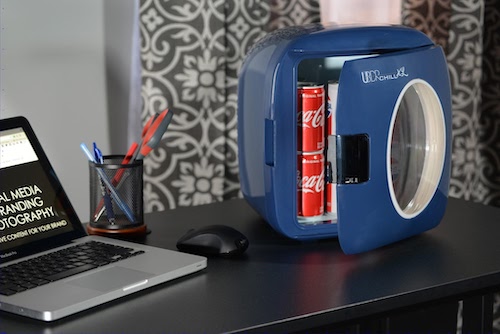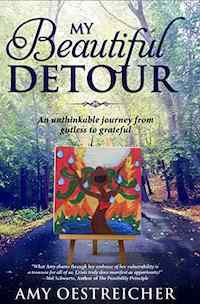During her senior year of high school, Amy Oestreicher underwent extensive medical trauma—her stomach unexpectedly ‘exploded’ and she needed years of intense surgeries. The young actress and aspiring college student was also the victim of sexual assault in her teens. Now in her early 30s, Connecticut native Amy Oestreicher—an artist, actress, author, and Ted Talk-er—discusses why she’s a survivor—and ‘thriver.’
You will love Amy. To me, she’s the epitome of a fighter—and very resilient. This is her story.
Interview by Rachel Sokol
In April 2015, during Passover with your family, you felt horrible pains in your stomach and were rushed to the hospital, where your belly—for lack of a better word—‘exploded.’ Then, for a long time, you couldn’t even drink or eat until it was considered ‘safe’ to do so. How do people react when they hear all this?
It depends on what order I tell my story in; so many things have happened in my life, that sometimes I throw things in and people gasp like, “Wait, back up!” Usually, it’s the fact that my stomach (literally) exploded that make people’s jaw drop. And then after that was my coma, and organ failure. When I tell them I couldn’t eat or drink for so long, they want to know how I was able to sustain myself—I have to tell them a few times that I couldn’t even chew an ice cube because of the surgeries. There’s no easy way to say how difficult that was for me! I couldn’t eat or drink for three years, until a big surgery, but then that didn’t work, and I could only eat for a month before my wound exploded again. People mostly want to ask how my spirit was able to stay so positive through everything–and why I have so much energy! But I wouldn’t call myself a positive person. I would say I’m finally at the point where I can be present with whatever I’m feeling–good, bad, or ugly. But that took a long time to realize.
 You are a survivor of sexual assault; a former music mentor—and you talk about him in your book—abused you as a teen. What advice do you have for a kid who struggles with speaking out?
You are a survivor of sexual assault; a former music mentor—and you talk about him in your book—abused you as a teen. What advice do you have for a kid who struggles with speaking out?
For a while I felt like there was something wrong with ME. A therapist told me, “You have to tell your story.” I thought she was oversimplifying things. So, I just thought to myself, “What the heck, I’ll say it.” But I couldn’t speak. At that moment, I knew that the therapist was right; I had to tell my story in order to move through it. I had no idea it would be so difficult. Eventually, I started writing, and realized that when a trauma happens, even if we don’t immediately identify it as “traumatic,” words are often the last piece that comes to us. At first, it just comes to us in flashes of images, sounds, physical sensations...If you don’t know how to speak up yet, try to express however you’re feeling with some kind of creative expression–it can be a doodle, a scribble, a song, a movement, even cooking up a recipe. And ask for help. Find a person in your life you trust and say, “Hey, I’d just love to catch up for a bit.” And if you see a friend who seems like something may be bothering them, ask, “Hey, how are you?” When I was betrayed by someone who I really trusted, I was too afraid to tell anyone. I kept that secret inside, and all that confusion, shame and anger that tormented me. I didn’t realize, until I was able to share it, how much better that alone made me feel. RAINN is also a great resource to find support and safe centers in your area.
In your book, you discuss the ways you channeled your healing: from writing and starring in a play you wrote, to journaling, to painting. Why are creative outlets so important when the going gets tough?
Creativity is a way we can ‘own’ all of the energy inside us–we can take whatever we’re feeling, whether it’s excitement, anger, fear, loneliness, or thoughts we don’t understand, and get it out of us, in a healthy way. Creativity is a mind-set; a way of seeing the world. Creativity puts the magic back in life, so not only are we never bored, we are constantly inspired, present, empowered, and–dare I say it–happy. When my traumas occurred, they became my lifeline. Now that I am out of my medical crisis and into a life of health once again, the arts are how I can reconnect with the world, make a difference and raise awareness of the power of one’s internal resources. When I discovered painting, I had suddenly found a way to express things that were too painful and overwhelming for words.
 Tell us about your TedTalk—what is the take-away message?
Tell us about your TedTalk—what is the take-away message?
TED Talks are all about ideas that are worth spreading, to better ourselves and our world. My idea worth spreading? That someone who follows life’s unexpected detours and searches for the flowers along the way to make their journey meaningful is, in fact, a Detourist. I felt that this idea was worth spreading, simply because when I started to approach my personal journey as just a detour in life that I could navigate myself, it really made the bumpy ride ahead of me a lot easier to manage.
What's next for you, creatively?
Many things, since it’s the creativity that has kept me going! But more specifically, I toured my one-woman musical, Gutless & Grateful, for almost eight years, which really tells my story of what happened to me in a pretty linear narrative. I recently premiered Passageways, which I’m very excited about–it’s a multimedia fantastical one-woman musical with 16 original songs. I’m also in rehearsal for a full-length play I wrote about my grandmother. At age 18, she was aHolocaust survivor, and I’ve always wondered how she was able to stay so strong, surviving what she did.
You attended Hampshire College in your mid-20s. What did you learn about yourself through the whole college experience?
I fell into a coma a week before I had to decide what college I would go to. So going off to college with the rest of my senior year class was out of the question. I was ready to give up on college all together. I thought year after year I would be ready, but more medical setbacks kept coming up, and before I knew it, 2005 had turned to 2013, and all of my high school friends had seemed to go on to lead “normal” lives – or what I had always assumed was “normal.” I had spent so many years mastering “survival 101” that I felt like I didn’t need college – I had gotten enough “life experience.” But, what I didn’t expect was that going back to college at age 25 gave me an even wider array of colors to paint my life’s path with. I reawakened my thirst for knowledge, and learning about the world beyond just getting through.
 How are you feeling, health-wise, today?
How are you feeling, health-wise, today?
I’m feeling good, strong, and actually healthy! That’s not to say that I still don’t have medical circumstances I’m sorting out with doctors, because I do. There are a few leaks and wounds from surgeries that never healed properly, and I am still traveling to various hospitals to find answers. But I learned a long time ago, that if you wait to be “completely healthy” or feel “normal” – whatever that means, then you’ll spend your entire life waiting. The important thing is that I can eat and drink now. I can walk, talk, sing, dance, even if I can’t do “everything” I thought I would be able to do as a teen. Doctors can help fix things, but self-care is really what is going to keep us strong in the long term.
READ IT
Amy’s book, My Beautiful Detour: An Unthinkable Journey from Gutless to Grateful is available in print and Kindle via Amazon.com. You’ll learn more about her healing journey, her wonderfully supportive parents and brothers, how art and making chocolate was therapeutic for her, and much more. It’s an amazing, inspirational read. Purchase your copy today to learn more about Amy’s heroic health and wellness ‘detour.’
Learn more about actress, singer, author, and motivational speaker Amy Oestreicher at: www.amyoes.com.
